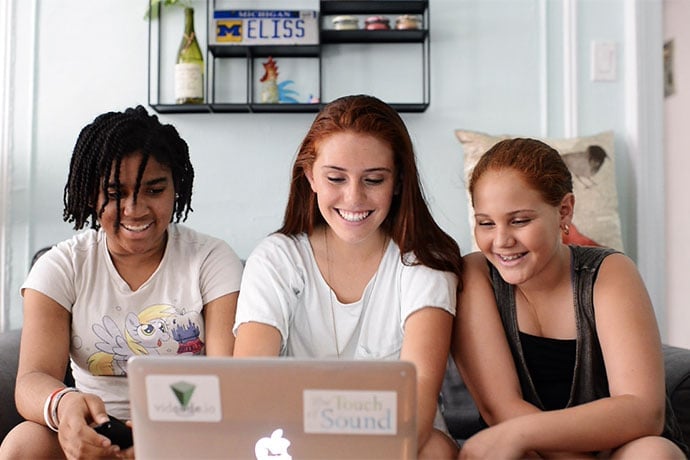They found a passion for STEM at different ages and followed different paths, but Alexandra Diracles and Melissa Halfon found each other at just the right moment. Little did they know at Startup Weekend EDU in January 2014, their collaboration would continue and evolve into Vidcode, a remarkable start-up company that teaches tween and teen girls to code through video editing.
Melissa grew up knowing exactly what she loved- math. Her aptitude for solving problems ultimately led her to computer science. At the University of Michigan, Melissa majored in Applied Mathematics and never doubted her passion, even though boys outnumbered her in her studies.
“There weren’t enough women in the field,” Melissa said. “It was always part of the experience, at the back of my mind, even though personally I found my way to computer science.”
When Melissa worked as a software developer in the finance industry, all of her bosses were male, an experience that definitely left its mark. She remembers her bosses undermining her abilities, leaving her to question if she was good enough.
“My boss told me he wasn’t sure if I was good for the job since I didn’t look like a programmer,” Melissa said.
Like many people in the industry, her boss held a stereotypical view that all programmers were males. However, the criticism failed to hold Melissa back as she continued her career; it only further prompted her interest in girls in STEM.
On the other hand, unlike Melissa, Alexandra was not passionate for STEM at a young age; instead, she loved art and photography. Alexandra majored in Photography and Imaging at NYU and worked for over six years teaching photography and film before finding her interest in technology. After visiting an exhibit titled ‘Talk to Me’ at MoMA, which featured engineering and human communication, she started to see the special use of technology in art.
“I felt like I had found something I was looking for for over 10 years,” Alexandra said.
She then attended NYU Tisch School of the Arts’ two-year graduate Interactive Telecommunications Program (ITP) which was founded by Red Burns, an esteemed female who inspired Alexandra “because she always preached the humanity in technology.”
“It [computer science] wasn’t portrayed as interesting, but once I started I thought wow it’s even more creative than photography,” Alexandra said. “You can create anything in the world with code.”
Similar to Melissa, Alexandra also noticed differences in roles of males and females in her program which consisted 50% of each gender.
“We [females] were taught not to get discouraged, but that disappeared,” Alexandra said. “A year in, a break down started to happen; girls didn’t talk about code as much as boys were.”
Alexandra and Melissa’s first-hand experience of gender bias in STEM fields inspired their first place project at Startup Weekend EDU. As a team with a few other members, they designed a platform aimed to creatively attract and expose girls to computer science. The prototype allowed users to manipulate pixels in video processing through coding in JavaScript.
“Part of what inspired me was that it was clear boys were doing a lot of work in their free time, and to compete girls needed to do the same,” Alexandra said.
After achieving success at the Startup Weekend EDU competition, Alexandra and Melissa continued to work on the prototype and launched Vidcode. The team tested the product with about 350 girls, mainly in 9th grade, and gathered great feedback with many positive responses. Their next step was fundraising on Kickstarter, where Vidcode successfully raised over $30k in October 2014.
“My favorite part of the experience was a moment later on when the first girl we did not know found and made something on Vidcode,” Melissa said. “The thread throughout that’s most satisfying is knowing that our work is going to somebody and it didn’t exist in the world before.”
Currently, the Vidcode team is working to spread its curriculum to schools across the country and is beginning to develop its platform into an IOS and Android mobile app. The company may still be a “baby” with four full-time employees, but they have big dreams. Their goal for Vidcode is to teach 10 million girls how to code by 2018. Alexandra and Melissa hope to take Vidcode to the limit, perhaps eventually including other graphics programming like 3D design.
Vidcode is not only a recreational tool for editing videos; it also acts for girls as an access point into computer science and other STEM interests. This prevents a substantial cause for low numbers of females in STEM: lack of exposure. Some girls, like Melissa, find STEM passions on their own, while for other girls, like Alexandra, exposure is all they need to recognize their potential in fields they thought were only for boys.
Alexandra and Melissa are determined, intelligent, and empowering females who simply want to provide all girls with the opportunity to enjoy coding. With such a breadth of experience, they offer meaningful advice for girls interested in STEM and anyone else pursuing a goal.
“Have a team. Surround yourself with good people and other girls that inspire you,” Alexandra said. “Aspiring dreams involves people that will support you, not slow your process. You don’t always have to do your strength, struggle through it and keep at it, because it comes down to solving new problems and not being too hard on yourself.”
This article also is available on Scientista, a foundation and resource created by women to help girls and young women explore and support themselves in science and engineering careers.
Learn More
Videcode.io
http://www.vidcode.io/
https://www.kickstarter.com/projects/2059265636/vidcode-a-coding-app-created-with-girls-in-mind
Alexandra Diracles
https://www.linkedin.com/pub/alexandra-diracles/33/495/b82
http://alexandradiracles.com/
https://twitter.com/stateofrelate

